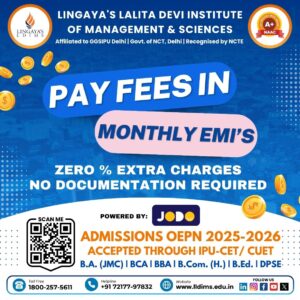Accreditations
LLDIMS is a certified and accredited institute that provides quality education that is recognized by the educational community.
5
national level
accreditations
With vibrant student organisations and societies on campus, you’ll never be short of opportunities to interact with like-minded students. The campus invites you to build friendships, bonds and actively participate in events and activities that interest you.
The University Grants Commission (UGC) established the National Assessment and Accreditation Council (NAAC) in 1994 as an autonomous institution with its headquarters in Bengaluru. NAAC’s mandate, as stated in its vision statement, is to make quality assurance an integral part of the operation of Higher Education Institutions (HEIs).
Vision
Mission
- Arrange for continuous monitoring and accreditation of institutions of higher education or units thereof or specific academic programs or projects;
- To stimulate the academic environment in higher education institutions to promote the quality of teaching, learning, and research.
- Encourage self-evaluation, accountability, autonomy, and innovation in higher education;
- Conduct quality-related research studies, consultancy, and training programs; and
- Collaborate with other higher education stakeholders for quality evaluation, promotion, and sustainability.
Value framework
NAAC promotes the following core values among the country’s HEIs:
- Contributing to National Development
- Fostering Global Competencies among Students
- Instilling a Value System in Students
- Promoting the Use of Technology
- Quest for Excellence
Guru Gobind Singh Indraprastha University (GGSIPU) was the first University set up by the Government of the National Capital Territory of Delhi in 1998. It was established under the provisions of the Guru Gobind Singh Indraprastha University Act, 1998, as amended in 1999. The University has been granted recognition by the University Grants Commission (UGC) of India under the Section 12B of the UGC Act.
It is a teaching and affiliating University with the explicit goal of facilitating and promoting studies, research, and extension work in the emerging areas of higher education. The focus is on professional education, such as engineering, technology, management studies, medicine, pharmacy, education, law, nursing, etc. It aims to achieve excellence in these and related fields and other matters connected or incidental.
Vision
Mission
Guru Gobind Singh Indraprastha University will work hard to provide a market-oriented professional education to the student community of India in general and of Delhi in particular. To serve the cause of higher education as well as meet the needs of Indian industries by promoting the establishment of colleges and Schools of Studies as centres of excellence in emerging areas of education with a focus on professional education in engineering disciplines.
Policy on quality
The National Council for Teacher Education has served as an advisory body to the Central and State Governments on all matters pertaining to teacher education since 1973. The secretariat is housed in the National Council of Educational Research and Training’s Department of Teacher Education (NCERT).
Vision
To contribute to India and the world by providing excellence in technical and vocational education and training. To be a valuable resource for industry and society and to be a source of pride for all Indians.
Mission
Aims
- Seek professional registration to provide youth with basic professional education in technical fields, allowing them to compete effectively in the labour market.
- We want to help people achieve rapid and inclusive growth by improving their employability (wage/self-employment) and ability to adapt to changing technologies and labour market demands.
- To improve people’s productivity and living standards.
- To achieve academic success.
- To give students a competitive advantage so they can get jobs in the best companies in the world.
- To review the Quality Policy and Objectives of the training courses offered by affiliates for continued suitability to comply with regulatory requirements. And continuously improve the effectiveness of the Quality Management System.
- To implement all of the ISO 9001:2008 Quality Management System clauses.
ISO is a non-governmental international organisation consisting of 167 national standards bodies.
It brings together specialists to share knowledge and develop voluntary, consensus-based, market-relevant International Standards. It aims to support innovation and provide solutions to global challenges through its members – The Central Secretariat is in Geneva, Switzerland.
Vision
Making people’s lives easier, safer, and better
ISO believes that International Standards, while largely invisible in our daily lives, are critical in making the world safer and better. By doing so, they can help to improve people’s quality of life on a daily basis.
Mission
- To bring people together to agree on International Standards that respond to global challenges through our members and their stakeholders.
- To achieve a sustainable future, ISO standards promote global trade, inclusive and equitable economic growth, innovation, and health and safety.
- ISO provides a neutral platform for experts from all over the world to collaborate and develop standards. Consensus building at multiple levels fosters a sense of confidence in our organization and the International Standards we produce, positioning us as a global leader in our field.
Goals
- Our standards must be widely used to realize our vision. We must ensure that our standards are of high quality, easily accessible, and usable and that people are aware of the benefits they provide.
- To make our vision a reality, we must create relevant consensus-based standards and address current and future challenges. We must concentrate on bringing the appropriate standards to market in the proper time, with the right content, and in the suitable format.
- To achieve our vision, our system must promote diversity and inclusion. We must ensure that we attract and retain the best experts while allowing everyone to participate. We must consider all perspectives when developing standards.








